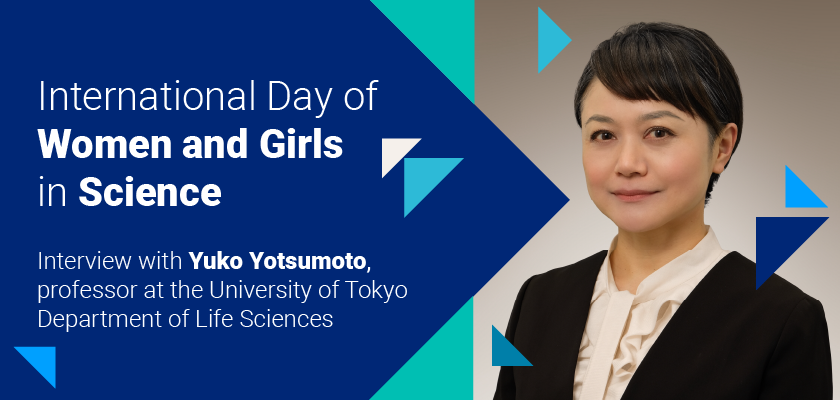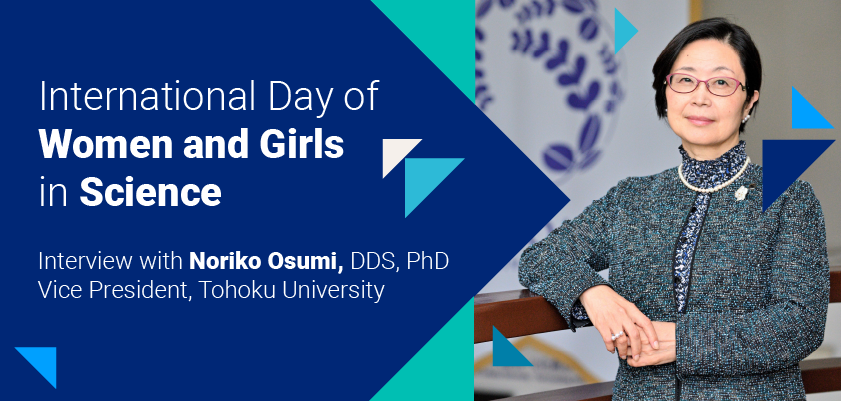The International Day of Women and Girls in Science
Interview with Yuko Yotsumoto

"Science is fun! Come to this field” – Yoko Yotsumoto, a professor at University of Tokyo, talked what made her enter the world of Science and the gender gap in the Science fields.
Cheik Ballo, Senior Manager at Hays Japan
 On February 2nd, 2023, I had the chance and honour to interview professor Yuko Yotsumoto-san from the University of Tokyo. She is the recipient of the 2018 Japan Society for the promotion of Science JSPS Prize. She has her own lab at the University of Tokyo (Yotsumoto Laboratory) which was established in June 2012, as a new lab for Cognitive Behavioural Sciences; they study how we process information in our everyday lives.
On February 2nd, 2023, I had the chance and honour to interview professor Yuko Yotsumoto-san from the University of Tokyo. She is the recipient of the 2018 Japan Society for the promotion of Science JSPS Prize. She has her own lab at the University of Tokyo (Yotsumoto Laboratory) which was established in June 2012, as a new lab for Cognitive Behavioural Sciences; they study how we process information in our everyday lives. Yotsumoto-san has been working in science for more than two decades, in both Japan and the United States. She is the first in her family to go to graduate school and earn a PhD. She is passionate about science, and describes it as sense of intellectual freedom, fulfilment, and empowerment. Even after so many years in the industry, and so many accomplishments, she still finds her work quite exciting. She sees a bright future for boys and girls interested to pursue a career in science.
“Science is fun…come to this field.”
Can please introduce yourself?

My name is Yuko Yotsumoto. I am. I'm a professor at the University of Tokyo Department of Life Sciences. I have been doing research in neuroscience, specifically the Sensation to perception. I have been studying how our brain process the information that we get through our eyes and ears and then all those touches.
I have been Working in this industry for what feels like like forever, but it's more than 20 years - 25 years, I think. My undergraduate degree was Psychology. And then I did two years of Graduate School in the University of Tokyo. And then I moved to the United States. I did a four years program where I got my PhD in psychology, where I did my thesis in mathematical models for the human visual memory. Then I worked for another five years in the Boston area, including Boston University and Mass General Hospital and Harvard Medical School, where I scanned people's brain (a lot of brains!) to see how our brains changes as we learn something, or what happens in the brain while we are sleeping, that kind of stuff. I lived in the US for Almost 10 years, and then I came back to Tokyo and then I have been working at the University of the Tokyo ever since.
So that's me!
When did you start being interested in science?
I don't remember the beginning, but, as long as I lived, I was interested in science. Biology was my favorite material in middle school and in high school. And then when I started doing research as an undergraduate student in the University of Tokyo, I think what was most exciting was the things I was studying, like visual perception, how we see things - I thought this is all really closely connected to my own daily life.
I see things while I'm walking around and then I understand. OK, now the light is coming into my eye and then now it's going to hit this retina and this neuron, and it goes to the brain, and then that information must be processed at this part of the brain then goes there. So all of these daily experiences could be part of my research. So that was the most exciting part, and I still find it quite exciting.
I see things while I'm walking around and then I understand. OK, now the light is coming into my eye and then now it's going to hit this retina and this neuron, and it goes to the brain, and then that information must be processed at this part of the brain then goes there. So all of these daily experiences could be part of my research. So that was the most exciting part, and I still find it quite exciting.
In your youth, did you have anyone or anything that inspire you to be interested in science?
I come from Miyazaki Prefecture. That's the that's a small, small town, In the South of Japan. I am the first one, in my whole family, who went to Graduate School after having a bachelor’s degree. My whole family were more into banking and finance. I'm the only person who was interested, who showed interest in science, or they Graduate School.
However, what I appreciate looking back, is that although one stopped me, and there were no ‘obstacles’ as such, I didn’t have a role model.
What do you think are the biggest challenge for women entering into the science Field? You mentioned earlier, “nobody. Stop you” Why did you make that comment?
I think it is still common in Japanese culture, especially in the suburbs and countryside – maybe not so much big cities like Tokyo.
People my age, in my generation, or the older generation, still believe that the Women do not need as much education as men do, and higher degrees are not for women. So, if someone is growing up in that kind of environment, then it will be extremely difficult for that individual to develop this vision in academia or science - that will be the most difficult challenge. Fortunately, I didn't have that challenge, but I would imagine many younger generations still do.
Today, Women represent only 16% of the people working in STEM. What do you think women are so underrepresented?
Well, obviously there are many factors, but one of them will definitely be that women are slowly discouraged to pursue the career in STEM field. Even in the elementary school junior high school, teachers tell the students that women do not excel in mathematics, for example. So, if your school teaches you this, it’s difficult to take the first step in this career. I think that my generation has to take responsibility for the environment we created for the younger generation.
That being said; We are now aware that it's only 16% of women in STEM field. That's a huge problem, and we need to do better. For the younger generation right now, they have more opportunities. I can see a better future those younger generations because we are so aware of the really low numbers of STEM employment with women (16%). We need to work to increase this.

Women and Girls are still severely underrepresented in Japan and across the globe. Today, women represent only 27% of the workers in the STEM field globally, in Japan, we are at 16%. The field is still dominated by male workers.
What do you think is attractive about science? What is exciting about it?
I think it's intellectually freeing. I feel so much freedom in my mind. I can study pretty much anything that I find interesting. I read papers, and askwhy is this happening? Then I think I’m going to come up with some experiments to test that hypothesis. I think if I write a paper, then I will be the first person in the world who knows the answer to that question.
And also as a job or work; I still have like a lot of freedom - I'm not working 9:00 to 5:00. So if I wake up, I don't feel. Good. Then I just look, I don't want to. I don't work today. Instead, I'm going to just read this book and then think about science. That's it. Or if I feel energetic, maybe I will work for 20 hours straight. But I can make my own schedule and then I do what I want to do. So, yeah, that's quite nice - I don't think many people have that luxury in their career.
You mentioned you've been working with science for more than 25 years. So what motivates you every day? What motivate you today?
Because I have my own lab in the University of Tokyo, my brilliant students, motivate me. They are the source of my motivation. They are amazing. I have 10 Different projects with each of my students and like they do the experiment that they want, then they report their results. We then have a meeting and then we can Make a plan for what we're going to do next. All those individual activities with my amazing students are a huge source of motivation for me.
What do you think we can do today to inspire more women to be interested in science?
Make more positions available for women, for women scientists. So right now, the positions are limited and it's super competitive. For example, if you have 1 opening at the university, hundreds of people apply to this only one position. We need to make the environment accessible for the women scientists so that they can pursue their scientific career from there.
What change do you see happening in the science in general, not related to women specifically, but what change do you see happening for the next decade in science?
The information, the amount of information has changed tremendously. So, when I was a student, I was able to read the papers that were directly related to my research, maybe 2-3 papers every week. That was enough to be able to have the sense that you were well read. But right now, there are hundreds, if not thousands of new scientific papers are published. It is impossible for one person to possibly handle. So, the research style must change with that amount of information.
And then in the future, of course, Artificial Intelligence and then the chatGPT will also change the way we conduct research. I don't know what's going to happen 10 years from now, but I would imagine that the amount of information will even increase more, compared to the right now. we're going to have to somehow come up with the way to deal with that impossible amount of information.
What do you think will be the most attractive sectors in science?
That's a hard question, I would say some sector that not many people have shown interest in, and then that's still somehow you find it interesting. That's the sector that is going to draw some in the future.
Do you think scientist are born or made?
Combination of both. I would say, because the data suggests so. I would like to say they are made, but we cannot ignore the genetic factors as well.
Some people may have a natural talent or characteristics that might be beneficial if you pursue the scientific career but having that DNA would not be enough. To be a good scientist, you need a good environment and hard work (effort). So, the answer is combination of both, but I would put more weight on the environmental factor.
What do you think of the 3 Technical skills anyone need to succeed in science?
Mathematics: Because everything must be based on the data and then when you handle the data. You do need some sort of understanding in math to interpret the data.
Writing: writing skills are important because we need to convey results and findings clearly.
And in my field we do need programming skills, so I would add like that.
Writing: writing skills are important because we need to convey results and findings clearly.
And in my field we do need programming skills, so I would add like that.
What do you think of the 3 Soft skills anyone need to succeed in science?
Resilience and persistence, because you need to focus and concentrate on one material.
And the third, you might not think this a soft skill, but I would say physical strength, because you do need to be physically fit to Keep up, you know, keep walking in this field.
And the third, you might not think this a soft skill, but I would say physical strength, because you do need to be physically fit to Keep up, you know, keep walking in this field.
Why? for example, when we do the experiments, we do the experiments from the morning till night and when I did the “sleep study “I used to go to work at 6:00 PM and then watch and measure someone's brain activity during the sleep until the morning. You need mental and physical strength to do that.
For all of the boys and girls thinking about a career in science. What advise you can share with them?
What advice? Don't listen to anyone who says you cannot do it. And if I may add, go overseas, see the world.
Is anything else we didn't mention today that you think is worth mentioning?
I think I said it all. Science is fun. So please pursue the career if you're interested. Science is great. Come to this field!

Yuko Yotsumoto, PhD
Professor in Department of Life Sciences
Graduate school of Arts and Sciences,
The University of Tokyo
Professor in Department of Life Sciences
Graduate school of Arts and Sciences,
The University of Tokyo

Cheik Ballo
Senior Manager at HAYS Japan
Chair & Japan representative
Helping for your tomorrow
Senior Manager at HAYS Japan
Chair & Japan representative
Helping for your tomorrow

